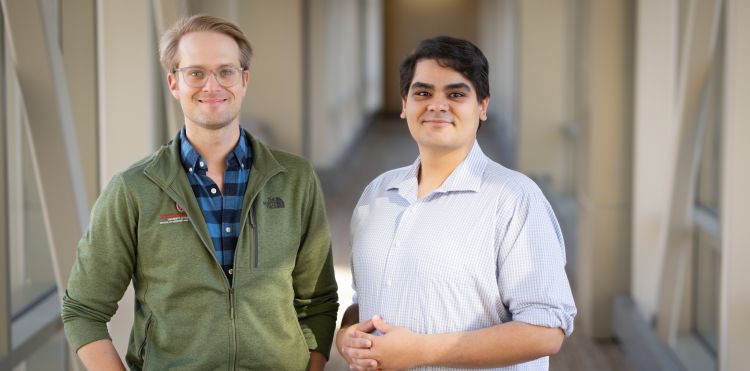The Sunde Award supports residents’ humanism-in-medicine projects

Adam Koryam, MD, PG-3, and Daniel Pastan, MD, PG-2, both University of Wisconsin internal medicine residents, received 2024 David Sunde Humanitarian Awards to develop programs that enrich humanism among our learners.
Given annually to one or more internal medicine residents, the Sunde Award comes with funding for projects that recognize the importance of putting one’s personal ego aside, working as a team, and treating a patient not just as someone who is an “interesting case,” but a full-fledged human being.
It’s named for David Sunde, who suffered from a multisystem illness that required the care of three physicians working closely with each other as well as the patient and his family.
For Sunde, this collaborative experience underscored the power of the human touch in medicine and led him—together with his employer at the time, Ohmeda Corporation—to establish the Sunde Award in 1993.
Culinary connections
Dr. Koryam, who is also a rising chief resident, used his Sunde Award funding to establish a series that uses food to highlight the international flavor of the residency program.
Each month, one resident brings a dish that is culturally important to them or their family to the program’s didactic session. The funding from the Sunde Award covers the cost of the food.
So far, residents have contributed dishes from Albania, Egypt, Colombia, Cameroon, and Wisconsin.
“Food does such a great job of bringing out people’s humanity,” says Dr. Koryam. “It gets them thinking about other parts of the world, other experiences and perspectives. I wanted residents to have the chance to celebrate and share their culture and learn about others.”
He also hopes this culinary exposure serve as a conversation starter with patients.
“It’s all been very well received. People seem to really enjoy learning about where other people are from. Also, there’s just a lot of great food out there!”
Books as balm
Dr. Pastan used his funding to establish an ongoing program in which residents can request the purchase of a book that is personally meaningful to them.
The award funding covers the cost of the books, which are added to the residency library in University Hospital, where they can be enjoyed by residents searching for a quiet moment or a reminder of their humanity.
“I wanted to do something that could provide comfort and consolation to residents on shift in the middle of the night,” says Dr. Pastan, who studied English literature as an undergraduate. For him, books were the obvious answer. “Besides, vinyl records were a little impractical.”
Residents can also take books home to read and bring them back. There is no system for checking in or checking out.
“We wanted to have as few restrictions as possible. We wanted it to be inclusive—and that includes the types of books people can request. It doesn’t matter if it’s a kid’s book or a serious novel.”
Residents and members of the department's education team have so far contributed around 40 titles, including books about medicine, poetry collections, Spanish language books, Calvin and Hobbes comics, a copy of Don Quixote, and a collection of Raymond Carver’s short stories.
Now that purchasing has opened to this year’s interns, Dr. Pastan is excited to see how the library’s contents will grow.
Banner: Left to right, the 2024 Sunde Award recipients, Daniel Pastan, MD, PG-2, and rising chief resident Adam Koryam, MD, PG-3. Credit: Clint Thayer/Department of Medicine.